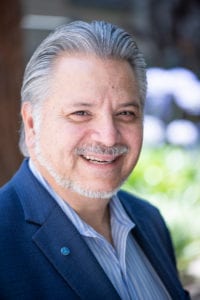Luis has dedicated his career to increasing equity on community college campuses and providing Latinx students the support they need to realize their educational goals. Before joining CLP, Luis  led training and professional development for 16 years at the Puente Project, where he now chairs the board. When the League of United Latin American Citizens, better known as LULAC, decided to renew their focus on equity in education this year, Luis was tapped as one of the three people leading that effort. He recently sat down for a Q&A about his new role at LULAC and how it aligns with his work at CLP.
led training and professional development for 16 years at the Puente Project, where he now chairs the board. When the League of United Latin American Citizens, better known as LULAC, decided to renew their focus on equity in education this year, Luis was tapped as one of the three people leading that effort. He recently sat down for a Q&A about his new role at LULAC and how it aligns with his work at CLP.
Q: What motivated you to take a leadership position in shaping LULAC’s education platform?
Luis: LULAC is the oldest Latinx advocacy group in the country, almost 100 years old. An early LULAC case, Mendez vs. Westminster, ended segregation in public education in California in 1946. Another LULAC program in the 1950s, Little School of the 400, served as the basis for bilingual education in Texas. There is a long history of support for educational equity there. I thought, how do I want to be involved in this seminal work, especially in these times? So when LULAC approached me about becoming part of the national working group on education, I said yes.
Q: How does this relate to your work as a senior director at CLP?
Luis: I saw it as an opportunity to share what’s going on with Guided Pathways efforts under way in California community colleges. For both Guided Pathways and the LULAC committee on education, it’s not just about the problems, but learning how we can address educational inequities—rather than yelling and screaming, talking about the solutions. We are going to focus on three issues: innovation, including tech; educational leadership and supporting a pipeline of educators; and equity in education. We’ll be using research to identify promising practices. Community-based organizations like LULAC can propose long-lasting solutions because of their closeness to the community. It’s really tapping an untapped resource.
Q: You led an education platform roundtable in July, at the annual LULAC convention in Milwaukee. What did you accomplish there?
Luis: At the convention, we did a launching workshop where we shaped our platform and identified some key issues to address throughout the year. Many young people from the student committee were at the education platform roundtable that I led, and they are very interested in contributing, so I made sure there was at least one student at each table. We need young people to help lead and guide us to a better future.
My vocation and my advocacy are all around helping others. There is a quote I have in my email signature line that I believe in deeply, from Cesar Chavez: “All education should lead to service to others.”